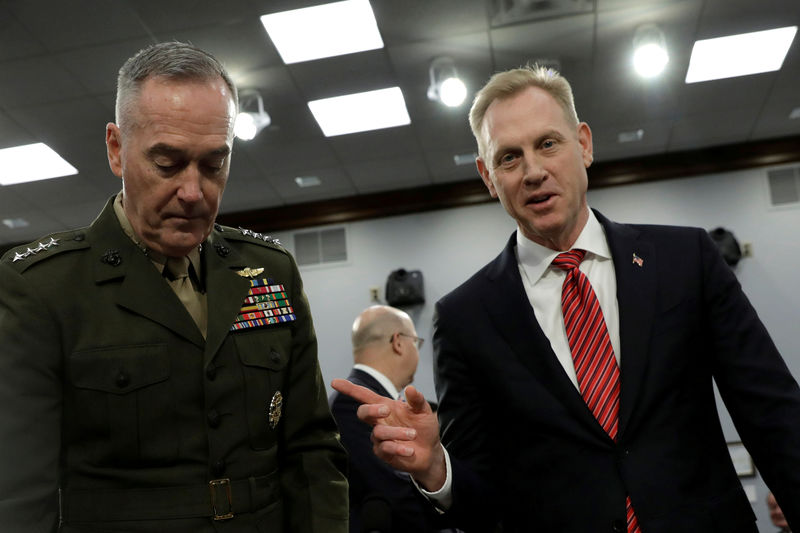By Phil Stewart and Idrees Ali
WASHINGTON (Reuters) - The Pentagon on Wednesday appeared to downplay any active preparations to directly intervene in Venezuela to topple President Nicolas Maduro, but acknowledged detailed contingency planning as political turmoil in the oil-rich nation deepens.
Hours after U.S. Secretary of State Mike Pompeo said the United States was prepared to take military action, if necessary, acting U.S. Defense Secretary Patrick Shanahan said the United States had carried out "exhaustive planning" on Venezuela.
But he and other officials continued to emphasize diplomatic and economic pressure as a way to help oust Maduro, as opposed to a U.S.-military led regime change.
Asked at one point whether the U.S. military had been given instructions to prepare for a conflict in Venezuela, perhaps by prepositioning U.S. troops, Kathryn Wheelbarger, the acting assistant secretary of defense for international security affairs, said: "We, of course, always review available options and plan for contingencies.
"But in this case we have not been given (the) sort of orders that you're discussing, no," Wheelbarger told the House Armed Services Committee.
So far, the U.S. military has been largely a spectator amid the unfolding U.S. foreign policy decisions on Venezuela, although it offered small contributions, like helping shuttle humanitarian aid to Colombia for further transport to Venezuela.
It has also ramped up its intelligence collection and intelligence sharing with allies, like Colombia, while planning for a possible non-combatant evacuation of Americans from Venezuela, should the need arise. Such planning is standard in any crisis of Venezuela's magnitude.
The top uniformed U.S. military officer, Marine General Joseph Dunford, said he was focused on intelligence gathering and being prepared to respond, if Trump sought greater involvement by the Pentagon.
But he stressed that the military should act in a way that deepens its partnerships in Latin America -- where the prospect of U.S. military intervention is deeply unpopular.
"I think it really is very, very important that we work with others in the region to solve this problem," Dunford said.
DAY AFTER MADURO'S FALL
Opposition leader Juan Guaido, who is recognized as Venezuela's president by some 50 countries including the United States, has so far failed to enlist Venezuela's military leaders in his bid to remove Maduro from power. He faced a high-profile test of support on Wednesday after calling for the "largest march" in Venezuela's history.
U.S. Navy Admiral Craig Faller, commander of U.S. Southern (NYSE:SO) Command, which oversees U.S. forces in Latin America, said a big focus for the United States and its partners in the region would be helping to restore vital Venezuelan economic infrastructure after Maduro's exit -- something he called "Day Now" planning.
"We call it 'Day Now' because there is going to be a day when the legitimate government takes over, and it's going to come when we least expect it -- and it could be right now," Faller said.
When asked if he saw a role for the U.S. military in actually overthrowing Maduro's government, Faller said: "Our leadership's been clear: It has to be, should be, primarily a democratic transition."
Still, he said Southern Command was ready to act if called upon for any scenario.
"We're on the balls of our feet," he said.
In a sign the crisis was grabbing the full attention of Trump's national security leaders, Shanahan canceled a planned trip to Europe on Wednesday, in part to help coordinate with the White House National Security Council and State Department on Venezuela.

The National Security Council scheduled a meeting for Wednesday afternoon to discuss next steps.